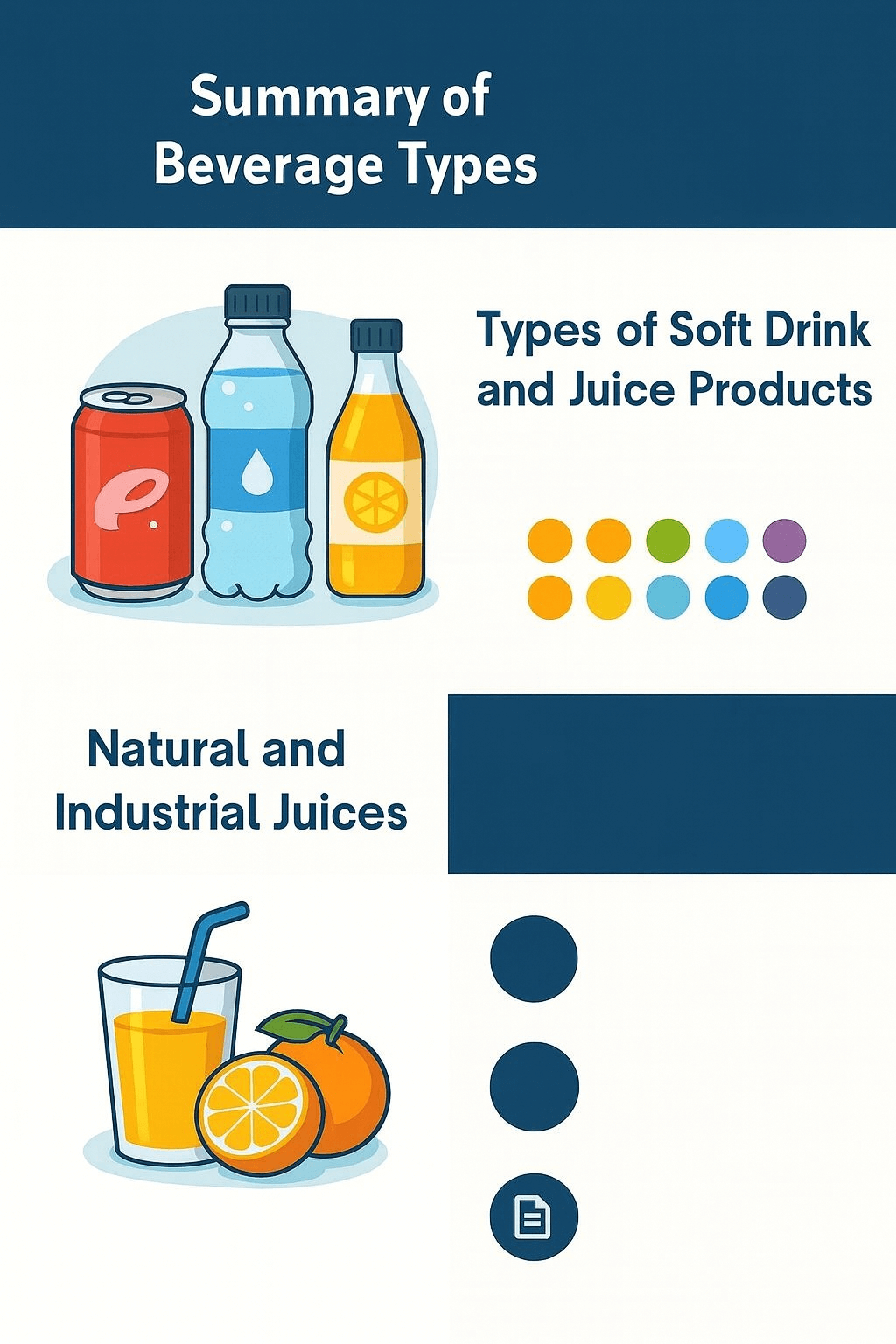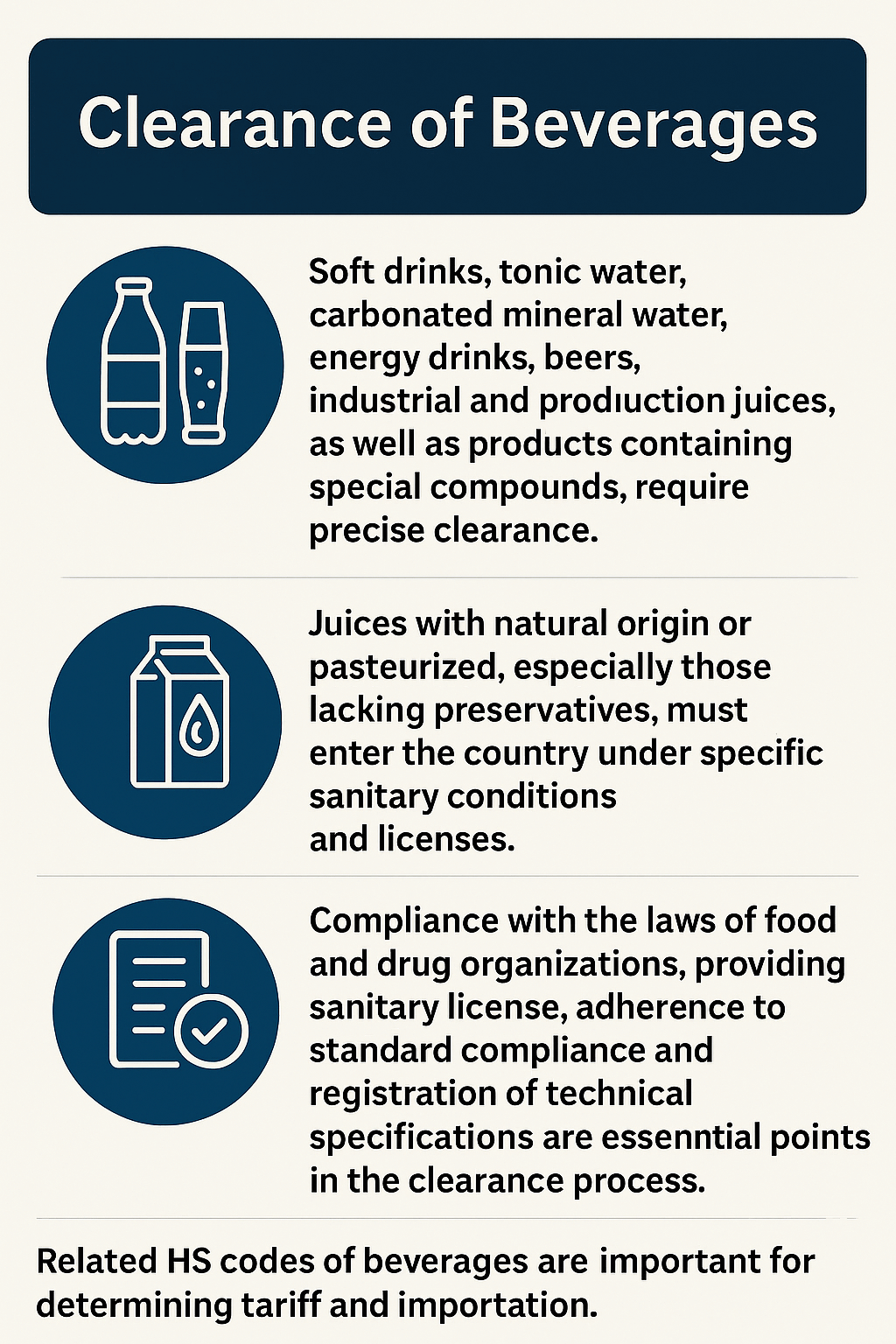Clearance of Soft Drinks and Fruit Juices from Iranian Customs (HS Codes + Documents & Permits)

To estimate the time and cost of clearing soft drinks and fruit juices, contact the Saba Tarkhis experts.
Instant Free Consultation1) Types of Soft Drinks and Fruit Juices
2) Key Points in Clearing Beverages from Customs
For importing soft drinks and fruit juices into Iran, knowledge of customs regulations and strict compliance is essential. The most important points in this process include the following:
3) Customs Tariffs and HS Codes
Tariffs and HS Codes for Soft Drinks
Factors affecting soft drink tariffs:
- Type of sweetener: Drinks containing sugar, artificial, or natural sweeteners may fall under different tariff treatments due to differing health and economic impacts.
- Sugar-free or low-calorie drinks: Products made with low-calorie or sugar-free sweeteners may be classified differently.
- Energy drinks: This category, containing stimulants like caffeine and taurine, may fall under different codes than regular soft drinks.
- Cola drinks: Because they contain specific substances such as caffeine and botanical extracts, they may be subject to different customs duties.
Tariffs and HS Codes for Fruit Juices
Factors affecting juice tariffs:
- Juice purity percentage: 100% juices generally face higher tariffs than juices diluted with water or sugar.
- Fruit type: Juices made from rare/imported fruits (e.g., mango or tropical fruits) may face higher duties than common ones like orange or apple.
- Mixed juices: Products combining several fruits may fall under different duties depending on composition and ratios.
- Concentrated juices: Juices imported as concentrate for later dilution typically have different duty treatment than ready-to-drink juices.
Impact of Customs Tariffs on Import/Export Costs
- Duty increases/decreases: Duty may vary by product type and country of origin, which directly impacts final import/export costs.
- Market competitiveness: Lower tariffs may improve competitiveness domestically or abroad, while higher tariffs can reduce profitability.
- Pricing impact: Customs costs form part of total cost and influence final market pricing, affecting strategic decisions on pricing and target markets.
| Goods | Short Description | HS Code |
|---|---|---|
| Carbonated soft drinks | Containing carbonate and flavorings | 2202.10 |
| Fruit juices (other) | Pure or mixed, juice-based | 2009.89 |
* The exact subheading may vary depending on fruit type, purity percentage, formulation, and processing.
4) Required Documents
Providing documents on origin of goods, purchase invoice, health certificate, and in some cases quality and safety certificates is mandatory for clearing these products.
5) Import Conditions
6) Order Registration and Obtaining Necessary Permits
7) Special Conditions for Importing & Exporting Soft Drinks and Fruit Juices
8) Exporting and Importing Countries of Soft Drinks and Fruit Juices
9) Import and Export Volumes of Soft Drinks and Fruit Juices
Need precise HS Codes and permit consulting? Our team manages your file end-to-end.
Submit Proforma Request
Frequently Asked Questions
What are the HS Codes for soft drinks and fruit juice?
For carbonated soft drinks, typically 2202.10, and for fruit juices (other), typically 2009.89; the final subheading depends on formulation and purity.
What documents are required for clearance?
Origin of goods, invoice, health certificate, quality certificates (if needed), and the Food & Drug Organization permit. Quality and health tests are also mandatory.
How does order registration in the Comprehensive Trade System help?
It stabilizes the process, secures required permits, reduces clearance delays, and facilitates document compliance with regulations.
Are formulation or packaging adjustments required?
Yes; in some cases, to comply with Iranian national standards, formulation or packaging adjustments before market entry are mandatory.
Special Customs Clearance Services by Saba Brokerage
As a reputable customs broker, Saba Brokerage offers special services for importing soft drinks and fruit juices. These services focus on specialized consulting, order registration, obtaining required permits, and comprehensive document management so the import process for these products finishes quickly and without issues.
Specialized beverage clearance services:
- Specialized and strategic consulting: Our experienced experts help you choose optimal import and clearance paths for soft drinks and juices, including detailed tariff review, document preparation, and understanding special import conditions.
- Order registration and obtaining customs permits: All steps are performed precisely and in line with customs regulations to reduce costs and speed up clearance so imported goods reach the market quickly.
- Expedited clearance: Leveraging strong networks with customs bodies and relevant organizations, the clearance process is expedited, reducing storage costs and speeding market access.
- Accurate document management: Proper, precise management of documents is critical. Our professional team prevents potential issues and ensures all documents are submitted on time and without defects.
- Repackaging and formulation adjustment: If re-packaging or formulation changes are required to meet domestic standards, special services are provided so products fully comply with local regulations.
.png)
